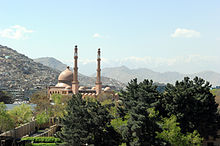
Back موسيقى أفغانية Arabic আফগানিস্তানের সঙ্গীত Bengali/Bangla Afghanische Musik German Muziko de Afganio EO Música de Afganistán Spanish موسیقی افغانستان FA Afganistanilainen musiikki Finnish Musique afghane French Musik Afganistan ID アフガニスタンの音楽 Japanese
This article needs to be updated. (April 2022) |

| Part of a series on the |
| Culture of Afghanistan |
|---|
 |
| History |
| People |
| Languages |
| Mythology |
| Cuisine |
| Festivals |
| Religion |
| Sport |

The music of Afghanistan comprises many varieties of classical music, folk music, and modern popular music. Afghanistan has a rich musical heritage[1] and features a mix of Persian melodies, Indian compositional principles, and sounds from ethnic groups such as the Pashtuns, Tajiks and Hazaras. Instruments used range from Indian tablas to long-necked lutes. Afghanistan's classical music is closely related to Hindustani classical music while sourcing much of its lyrics directly from classical Persian poetry such as Mawlana Balkhi (Rumi) and the Iranian tradition indigenous to central Asia. Lyrics throughout most of Afghanistan are typically in Dari (Persian) and Pashto. The multi-ethnic city of Kabul has long been the regional cultural capital, but outsiders have tended to focus on the city of Herat, which is home to traditions more closely related to Iranian music than in the rest of the country.[2]
Under the rule of the Taliban, both from 1996 to 2001 and again when they took power by force in 2021, music has been considered prohibited.[3][4]
- ^ Simon Broughton, Mark Ellingham, Richard Trillo. (1999) "World Music: Latin & North America, Caribbean, India, Asia and Pacific" p.3 [1]
- ^ Doubleday, pg. 4
- ^ Perez-Solero, Ricardo (1 October 2022). "The Taliban forbids music. These young musicians who fled have new problems". South China Morning Post. Retrieved 27 March 2023.
- ^ Saar, Zamir (7 October 2021). "As Most Music Is Silenced in Afghanistan, a Style Favored by the Taliban Fills the Void". Wall Street Journal. Retrieved 27 March 2023.